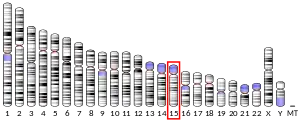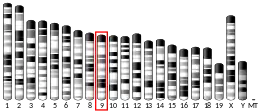| DMXL2 | |||||||||||||||||||||||||||||||||||||||||||||||||||
|---|---|---|---|---|---|---|---|---|---|---|---|---|---|---|---|---|---|---|---|---|---|---|---|---|---|---|---|---|---|---|---|---|---|---|---|---|---|---|---|---|---|---|---|---|---|---|---|---|---|---|---|
| Identifiers | |||||||||||||||||||||||||||||||||||||||||||||||||||
| Aliases | DMXL2, RC3, PEPNS, Dmx like 2, DFNA71, EIEE81 | ||||||||||||||||||||||||||||||||||||||||||||||||||
| External IDs | OMIM: 612186 MGI: 2444630 HomoloGene: 41022 GeneCards: DMXL2 | ||||||||||||||||||||||||||||||||||||||||||||||||||
| |||||||||||||||||||||||||||||||||||||||||||||||||||
| |||||||||||||||||||||||||||||||||||||||||||||||||||
| |||||||||||||||||||||||||||||||||||||||||||||||||||
| |||||||||||||||||||||||||||||||||||||||||||||||||||
| Wikidata | |||||||||||||||||||||||||||||||||||||||||||||||||||
| |||||||||||||||||||||||||||||||||||||||||||||||||||
Dmx-like 2 is a protein that in humans is encoded by the DMXL2 gene. [5]
Function
This gene encodes a protein with 12 WD domains. Proteins with WD domains are involved in many functions including participation in signal transduction pathways. Participation of the encoded protein in regulation of the Notch signaling pathway has been demonstrated in vitro using several human celines.[6] A gene encoding a similar protein is located on chromosome 5. Multiple transcript variants encoding different isoforms have been found for this gene.
Clinical relevance
Haplosufficiency of Dmxl2 has been identified as the cause of Polyendocrine-polyneuropathy syndrome, and delayed puberty. Research has indicated that this is a result of altered function of CNS synapses (in which the protein product of Dmxl2 is expressed) causing altered activation of the GnRH neurons of the hypothalamus.
See also
- DmX gene - the homolog in D. melanogaster
References
- 1 2 3 GRCh38: Ensembl release 89: ENSG00000104093 - Ensembl, May 2017
- 1 2 3 GRCm38: Ensembl release 89: ENSMUSG00000041268 - Ensembl, May 2017
- ↑ "Human PubMed Reference:". National Center for Biotechnology Information, U.S. National Library of Medicine.
- ↑ "Mouse PubMed Reference:". National Center for Biotechnology Information, U.S. National Library of Medicine.
- ↑ "Entrez Gene: Dmx-like 2".
- ↑ Sethi N, Yan Y, Quek D, Schupbach T, Kang Y (2010). "Rabconnectin-3 is a functional regulator of mammalian Notch signaling". J. Biol. Chem. 285 (45): 34757–64. doi:10.1074/jbc.M110.158634. PMC 2966091. PMID 20810660.
Further reading
- Nagano F, Kawabe H, Nakanishi H, Shinohara M, Deguchi-Tawarada M, Takeuchi M, Sasaki T, Takai Y (2002). "Rabconnectin-3, a novel protein that binds both GDP/GTP exchange protein and GTPase-activating protein for Rab3 small G protein family". Journal of Biological Chemistry. 277 (12): 9629–32. doi:10.1074/jbc.C100730200. PMID 11809763.
- Sethi N, Yan Y, Quek D, Schupbach T, Kang Y (2010). "Rabconnectin-3 is a functional regulator of mammalian Notch signaling". Journal of Biological Chemistry. 285 (45): 34757–64. doi:10.1074/jbc.M110.158634. PMC 2966091. PMID 20810660.
- Luke MM, O'Meara ES, Rowland CM, Shiffman D, Bare LA, Arellano AR, Longstreth WT, Lumley T, Rice K, Tracy RP, Devlin JJ, Psaty BM (2009). "Gene variants associated with ischemic stroke: The cardiovascular health study". Stroke. 40 (2): 363–8. doi:10.1161/STROKEAHA.108.521328. PMC 2881155. PMID 19023099.
- Shiffman D, O'Meara ES, Bare LA, Rowland CM, Louie JZ, Arellano AR, Lumley T, Rice K, Iakoubova O, Luke MM, Young BA, Malloy MJ, Kane JP, Ellis SG, Tracy RP, Devlin JJ, Psaty BM (2008). "Association of gene variants with incident myocardial infarction in the Cardiovascular Health Study". Arteriosclerosis, Thrombosis, and Vascular Biology. 28 (1): 173–9. doi:10.1161/ATVBAHA.107.153981. PMC 2636623. PMID 17975119.
- Kawabe H, Sakisaka T, Yasumi M, Shingai T, Izumi G, Nagano F, Deguchi-Tawarada M, Takeuchi M, Nakanishi H, Takai Y (2003). "A novel rabconnectin-3-binding protein that directly binds a GDP/GTP exchange protein for Rab3A small G protein implicated in Ca(2+)-dependent exocytosis of neurotransmitter". Genes to Cells. 8 (6): 537–46. doi:10.1046/j.1365-2443.2003.00655.x. PMID 12786944.
This article incorporates text from the United States National Library of Medicine, which is in the public domain.



